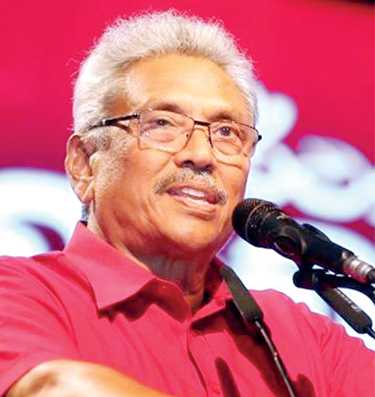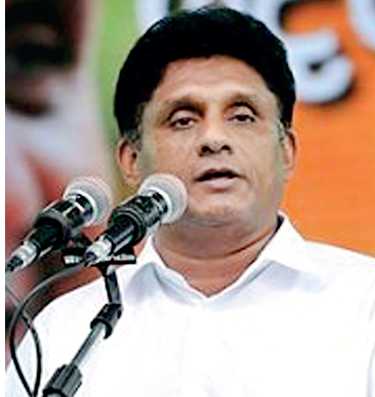Monday Feb 16, 2026
Monday Feb 16, 2026
Thursday, 28 November 2019 01:03 - - {{hitsCtrl.values.hits}}
 |
 |
| President Gotabaya Rajapaksa | Sajith Premadasa |
The aftermath of the recently-concluded polls in Sri Lanka showcased that elections are still treated as a zero sum game along partisan lines. However, with many in Sri Lanka yearning for a new beginning, we should question if this is a reductionist view, and ignores the importance of the moment at hand.
Unlike recent election cycles, a glaring feature of this presidential election was that Gotabaya Rajapaksa and Sajith Premadasa are markedly different from the parties that back them. What implications does this present for Sri Lanka and its future?
Policy reversals arising from the left-right divide
Post-independence in 1948, Sri Lankan politics has been dominated by two-main formations: a centre-right formation spearheaded by the UNP, with Ranil Wickremesinghe as its current leader, and a centre-left formation which has evolved through time from the SLFP to its current form, as the SLPP, led by the Rajapaksas.

In the last 15 years, under Ranil Wickremesinghe and Mahinda Rajapaksa, this left-right divide became a chasm with the UNP being lambasted repeatedly as a neo-liberalist, rich man’s party, while the UPFA became the dominant force among the predominantly Sinhala-Buddhist middle class and rural communities.
This gulf in political philosophies has proved to be a key driver of policy instability in Sri Lanka. For instance, the economic policies of the left envisaged expansion of the State sector, government intervention in free markets and a State-led development model. The right-wing liberals, on the other hand, championed the opposite, including the reduction of the size of the State sector, a reduced government role in markets and attempted reform of State institutions.
As a result, completely overhauling the preceding government’s agenda became the norm, upon the election of each new government. In an attempt to appeal to its core support base, the UNP became more oriented towards the private sector and urban centres, while the Rajapaksa-led forces became torch-bearers of the Sinhala Buddhist masses and the rural community.
This left-right divide was never more apparent than during the past five years of the Yahapalanaya Government, which was predicated on the SLFP and UNP working together to drive policy. Notably, having faced a long period of electoral defeats in the preceding period, the UNP’s traditional right wing policies were nuanced with what the party faithful labelled as “social market economics”, which involved extensive government intervention in markets, price controls and multiple olive branches to the masses.
Nevertheless, the rural agrarian-based economic model of the UPFA and the private-sector-led development model of the UNP was never going to co-exist peacefully, culminating in a tug-of-war and ultimately, policy paralysis.
A historic policy alignment
However, this Presidential Election saw a reversal in these stereotypes with Sajith Premadasa moving the UNP agenda decisively to the left, while Gotabaya Rajapaksa moved the SLPP agenda equally decisively to the right.
A close read of Sajith Premadasa’s policies makes it clear that he is championing socially equitable, rural-based development with a modern twist, via the deployment of technology and innovation. Confronted with the heavy-handed treatment towards the private sector, a breakdown in security and economic stagnation under the Yahapalanaya Government, large swathes of the traditionally UNP-leaning private sector backed Gotabaya Rajapaksa on the expectation of him leading a private-sector-friendly, right-leaning development model for Sri Lanka.
The outcome of this realignment, in the philosophies of the main parties, is essentially a centrist policy platform with the traditional left-right divide decidedly blurred. Hence I would contend that Sri Lanka has been presented with a unique opportunity to push through much needed reforms, which otherwise are not likely to see the light of day.
However, assuming each party works according to its own self-interest, why would the UNP assist the Gotabaya Rajapaksa Government to push through reforms? Wouldn’t this be shooting itself in the foot since an ineffective, dysfunctional government would be the UNP’s best chance to capture power again? And given the prospect of a landslide victory in the upcoming general elections, why would the SLPP require the UNP assistance to push its policies through? I shall attempt to answer these questions from both the UNP’s and SLPP’s perspective in the following paragraphs.
UNP’s interest: Economic reforms would make the UNP more relevant over time
Sri Lanka has traditionally not encountered constructive opposition parties. Throughout its post-independence history, Sri Lanka has seen opportunistic oppositions which operate with a collective desire to capture power at all costs.
However, in a functional democracy an opposition plays an important part in policy formation through their work in inter-party committees, supporting the government on important reforms and holding the government accountable on key issues.
In his speech following the presidential election, Sajith Premadasa mentioned that he would help the government on positive initiatives, and he now has a chance to walk the talk as a possible opposition leader.
On the question of incentive, I would suggest that the UNP needs to be pragmatic. The election outcome made it clear that Rajapaksas remain the dominant force in Sri Lankan politics. As such, a government in which Gotabaya is President and Mahinda is Prime Minister is possibly the only formation, which has the political cachet to push through unpopular, but much-needed reforms.
While partisan viewpoints are natural in the aftermath of an election, Sri Lanka cannot afford policy instability due to different party philosophies. In Gotabaya Rajapaksa and Sajith Premadasa Sri Lanka seems to finally have two leaders who can work across the aisle and meet in the centre of the political divide
Reforming monolithic institutions such as CEB, and CPC is high on any government’s to-do list in terms of fiscal consolidation, but is rarely pursued meaningfully due to the high potential for political suicide, resulting in gifting an own-goal to a power-hungry opposition.
Sri Lanka cannot afford this policy lethargy any longer. The fact remains that the Sri Lankan economy needs painful surgery. In light of the dire electoral fortunes of the UNP in the last 20 years, I would argue that the UNP would be better served in aiding the reform process while in the opposition, rather than waiting for a mandate to do this as a government.
It is clear that UNP’s unpopularity among the suburban and rural Sinhala masses, would make it very difficult for it to play the role of reformer. Such moves would only lead to cementing the many negative connotations associated with the party as a lackey of the west and an enemy of the masses.
However, once these reforms are in motion, the fickle nature of the news cycle is likely to move towards a more substantive discussion on the merits of such policy, which the UNP is better placed to contribute to. Positives arising from such painful reforms will no doubt initially accrue towards the Rajapaksas. But I would argue that following the passage of reforms, the UNP’s agenda and its economic know-how is likely to gain more traction.
In politics contextual relevance is everything. The election demonstrated that the UNP cannot hope to gain the upper hand in an environment fraught with communal disharmony and mass suspicion about its economic policies.
When elections become a slugfest, on what the Rajapaksa political machinery has labelled “pro-patriotic vs. anti-patriotic” issues, the UNP is not positioned to win them. But once a process of reforms takes root the UNP would gain new relevance. This would enable the UNP to push through important parts of its agenda by leveraging the substantial political capital of the Rajapaksas, and solve important issues for all Sri Lankans.
Alignment of the UNP and SLPP is also likely to act as a check against the Rajapaksas becoming antagonistic and deviating from democratic norms. When the occasion has arisen, Mahinda Rajapaksa has demonstrated time and again that he can engineer a split within the UNP to get the support he requires.
Instead of opposing the new President and potential SLPP government on every major issue, how refreshing would it be if the UNP can take a clear stand that it will invest its political capital wisely by helping the new President to unlock some of Sri Lanka’s economic potential? This would enable the UNP to be an active participant in the reforms process and shape its direction rather than being a complaining bystander.
Rajapaksa’s interest in working with the UNP: A matter of legitimacy
While the Rajapaksas remain head and shoulders above their peers in the eyes of the Sinhala Buddhist majority, their perceived majoritarianism has long been an impediment to their relationship with the minorities and the international community. This is bound to exacerbate in the short term given the nature of Gotabaya Rajapaksa’s victory, in which the north and east predominantly voted for his rival, Sajith Premadasa. As such, the support of the UNP remains critical in selling a potential solution to the ethnic conflict to the minorities.
Given their involvement in the last stages of the war, both Mahinda and Gotabaya suffer from the negative stigma attached to them by the minorities. On the other hand, Ranil Wickremesinghe’s involvement with the Ceasefire Agreement of 2001 led to him being labelled an appeaser of the LTTE.
Hence from the current crop of the leadership across the UNP and SLPP, Sajith Premadasa remains the only post-war leader, who does not carry the heavy baggage of the war with him. Therefore, he is uniquely positioned to play a decisive role in shaping a solution to the ethnic conflict that satisfies both the Sinhala Buddhist majority and the minorities based in the north and east.
On the economic front, a boost in exports and higher FDI is a prerequisite for Sri Lanka’s development. Yet, the coverage on Gotabaya Rajapaksa’s election victory in the international press was tinged with caution and even outright negative in some cases. A clear alignment with the UNP on important policy issues will give President Gotabaya much needed legitimacy in the eyes of the international community and multilateral organisations, such as the World Bank and IMF.
This is likely to make his economic agenda substantially smoother in every aspect, including raising money in the debt markets, attracting investment and getting the support of Sri Lankan expatriates scattered around the globe. An SLPP administration can then also consider broader group of international partners rather than just China.
Conclusion
While partisan viewpoints are natural in the aftermath of an election, Sri Lanka cannot afford policy instability due to different party philosophies. In Gotabaya Rajapaksa and Sajith Premadasa Sri Lanka seems to finally have two leaders who can work across the aisle and meet in the centre of the political divide. Indeed, if not for his surname and hardline stance on security issues, it could be argued that Gotabaya would be a better fit within the UNP, purely based on his policy outlook.
Sajith on the other hand, being a working class politician with a rural support base, is possibly a better fit within the SLFP/SLPP. Assuming Sajith ascends to the UNP leadership, Gotabaya and Sajith, along with Mahinda, now have the chance to embark on a new journey within Sri Lankan politics.
Elections, while they are important to discern the people’s mandate, are not meant to be a gladiatorial fight to the death where the victor upturns the previous government’s policies and charts his own course. Yet, this is precisely what a switch in government has led to in post-independence Sri Lanka. Both the new President and his rival spoke about a new political order. It is now time to walk the talk!
(The writer is a Financial Analyst employed in Australia. He can be reached via email on [email protected]. This article reflects his personal views and does not represent the views of his employers.)